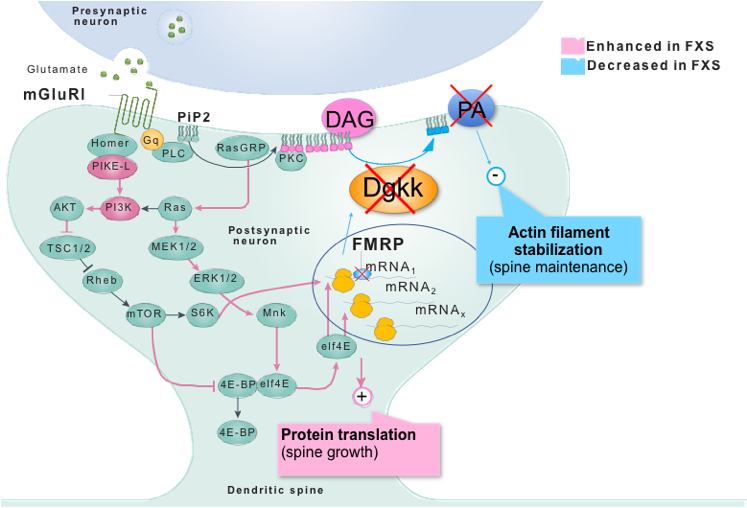My current research is focus on the Fragile X syndrome (FXS), the most common inherited cause of intellectual disability and autism. I began my work on this topic in 2016 when I started my PhD under the supervision of Dr Hervé Moine.
FXS is a trinucleotide repeat disorder leading to the silencing of the FMR1 gene and the absence of FMRP protein. The loss of FMRP results in an excessive neuronal protein translation with abnormal synaptic plasticity. Our team showed that FMRP is mainly associated with one unique mRNA in cortical neurons: diacylglycerol kinase kappa (Dgkκ), a master regulator controlling the balance between the signaling lipids diacylglycerol and phosphatidic acid. In absence of FMRP, the translation of Dgkκ is impaired in neurons, leading to an excess of diacylglycerol and a lack of phosphatidic acid.

Dgkκ silencing in WT mouse is sufficient to mimick FXS phenotypes while its overexpression corrects abnormal dendritic spines in Fmr1-KO neurons.Based on these data, we tested the targeting of DGK by pharmaceutical and gene-therapy approaches. The work I presented in Paris for the thematic day on viral vector showed at first the effect of pioglitazone, a DGK agonist, that corrects several phenotypes in cells and Fmr1-KO mice. These data suggest that modulating DGK activity is a promising therapeutic target for FXS. In a second time, I test a gene therapy using various adeno-associated viruses (AAV-9, AAV-rh10 and PHPe.B) that express a Dgkκ transgene. I tested the rescue of these viruses on Fmr1-KO phenotypes in cells and by various administration routes in vivo. Preliminary results show absence of adverse effect in neurons and in vivo with some rescue effects. Behavior analyses are in progress to determine the validity of this approach.
I learned a lot in this thematic day about gene therapy approaches and fundamental research on virus. Talks were very interesting, some topics were very close to my field from a technical point of view. The congress had an excellent atmosphere and organization was perfect.
On the end of the day I got the award for best poster price, and I was very surprised and thankful. I would like to thank the organizers for allocating me this prize, for all their investment to achieve this thematic day. I would like to thank Dr Hervé Moine to give me the opportunity to work on this amazing topic!